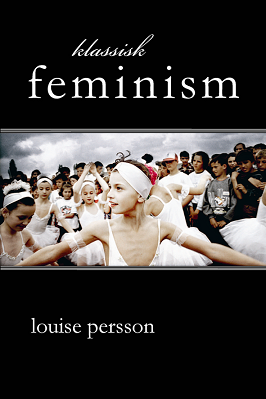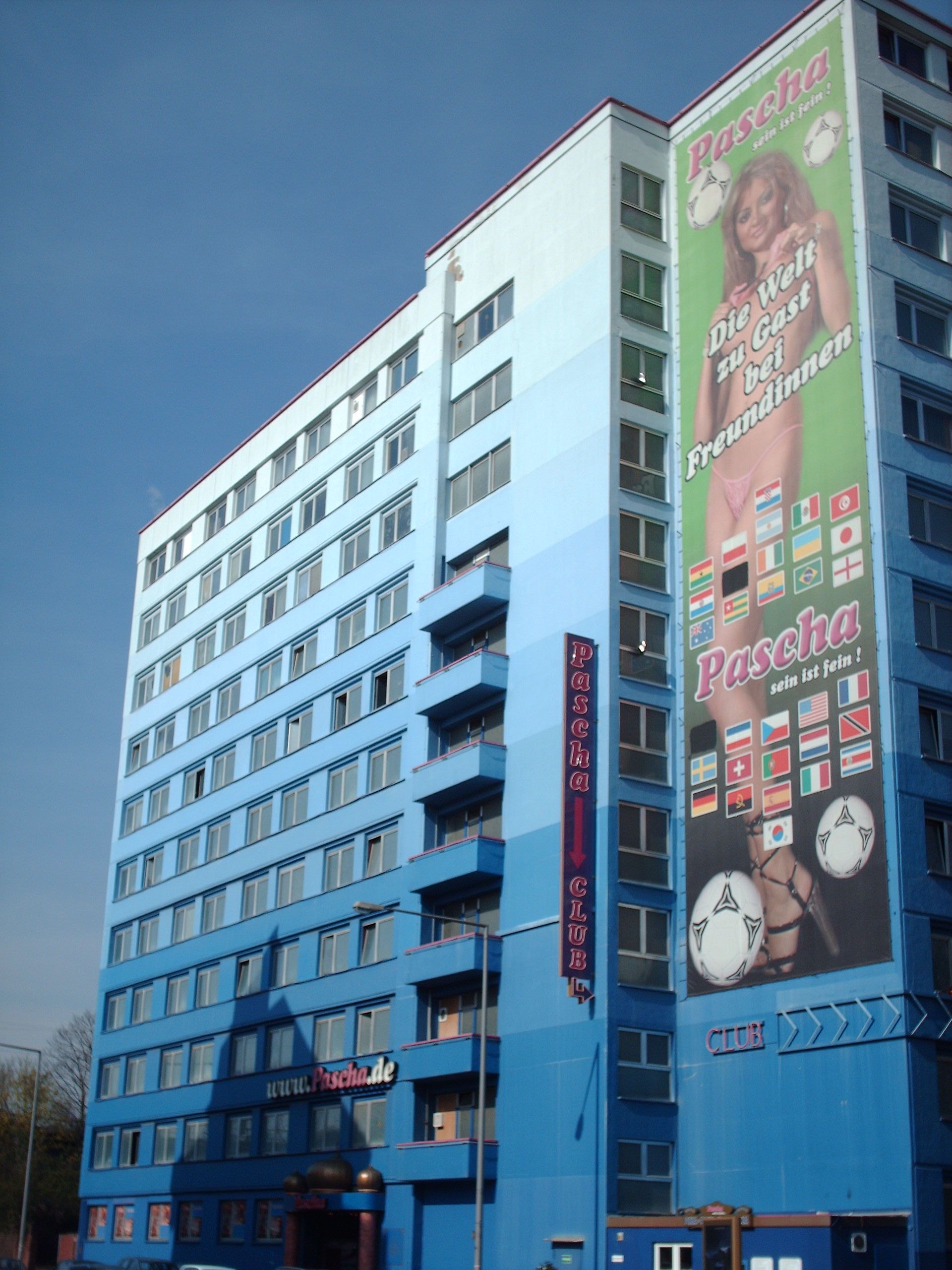 Wherever I go, wherever I live, I always meet people with critical, original and non-conforming views, and Sweden is no exception. Today’s special post comes from Louise Persson, whose book on ‘classical’ feminism came out last year and who has been blogging at Frihetspropaganda since March 2004. Her allegiance is to libertarianism, and she likes to call herself an activist. A longtime critic of the Swedish law criminalising the purchase of sex, Louise wrote the article below about the report on the government’s evaluation of the law, which was published on Friday. Links to numerous other Swedish critiques of the inquiry and report are at the end: many Swedes don’t like the law, but, since the government treats it as a symbol of Swedishness, these voices are rarely heard in public forums. Remind anyone of other governments we know?
Wherever I go, wherever I live, I always meet people with critical, original and non-conforming views, and Sweden is no exception. Today’s special post comes from Louise Persson, whose book on ‘classical’ feminism came out last year and who has been blogging at Frihetspropaganda since March 2004. Her allegiance is to libertarianism, and she likes to call herself an activist. A longtime critic of the Swedish law criminalising the purchase of sex, Louise wrote the article below about the report on the government’s evaluation of the law, which was published on Friday. Links to numerous other Swedish critiques of the inquiry and report are at the end: many Swedes don’t like the law, but, since the government treats it as a symbol of Swedishness, these voices are rarely heard in public forums. Remind anyone of other governments we know?
Behind the happy face of the Swedish anti-prostitution law
Or, the success that is the Swedish sex-purchase law, or maybe not . . .
Louise Persson, 3 July 2010
‘We don’t work with harm reduction in Sweden. Because that’s not the way Sweden looks upon this. We see it as a ban on prostitution: there should be no prostitution‘, said governmental inquirer Anna Skarhed smilingly to the journalist attending the press conference on the release of the report on an inquiry meant to evaluate the effects of the sex purchase law but not to question the law itself. And later: ‘Harm reduction is not the Swedish model.’ (long English summary pp 29-44, or key excerpts in English ).
Skarhed went on to say that prostitutes – women – are not marginalized. There are some who claim that, but ‘We don’t see that’.
The statement about harm reduction is highly interesting. A harm-reduction framework stands in opposition to moralistic laws, but Skarhed refused to acknowledge the law’s moral character, presenting it as merely a ‘ban’ on unacceptable behaviour. It isn’t really true either, that there is no harm reduction here. Sweden may be restrictive and repressive against users of illicit drugs and buyers of sex, but there are some pragmatic – harm reduction – programmes in Sweden. One might imagine that an expert on law appointed by government as an independent researcher would have some insight into the difference between pragmatism and ideology. You cannot assess the effects of the law without any understanding of harm reduction, it’s like assessing everything but the effects on the people involved.
The report’s claim that sexworkers are not marginalized is bafflingly arrogant, ignoring what many sexworkers say about how the law increases stigma and therefore their marginalization in society. See this video with Pye Jakobsson of Rose Alliance, as an example.
As a longtime critic of the law, I had low expectations, but this I didn’t expect: An astounding absence of objective and unbiased guiding principles, a lack of solid evidence and a confusing methodical picture that could mean outright guesswork. All the report’s conclusions are therefore questionable. I was prepared to focus on the fact that Skarhed wasn’t allowed to freely criticise the law, but the report itself is a worse problem. Now-familiar self-congratulatory references to Sweden’s higher moral ground compared with other countries are not missing: here the law is ascribed an almost magical power to eradicate patriarchy and sex trafficking, both.
‘Sources’ are mentioned, but absolutely nothing is explained about methodology. Sources mentions persons and organisations talked to, including ECPAT (although the child aspect of the law evades me) but there is nothing about how interviewees were chosen, why they were relevant, what questionnaire was used or how interviews were analysed.
Sexworkers themselves are listed as sources, but they seem to have been forgotten until quite late. They are called, in a discriminatory manner, ‘exploited persons’ (p. 126-127). A total of 14 persons from two organisations filled out a questionnaire: about half were active sexworkers from Rose Alliance, the other half former sexworkers from PRIS. The findings from this research were a foregone conclusion anyway: active sexworkers are said to be unaware of their own exploitation and former sexworkers to be happy with criminalisation. The similarity is striking to the feminist idea that all women in prostitution need to be rescued and liberated. What Skarhed doesn’t mention is that PRIS’s very few members had already declared themselves in favour of the law. Rose Alliance, also a small organisation, have been critical of the law, but at least they made the questionnaire available online to any sexworker who wanted to participate. Few found it worthwhile, unfortunately.* The issue here is that it is inappropiate to take two small, local organisations and claim they represent all active and former sexworkers.
Maybe suspecting the report will be taken as the ridiculous rubbish it is, Skarhed chose to publish a long, personal, heart-rending ‘story‘ of one unhappy former prostitute. The implicit (ridiculous) rhetoric aimed at anyone criticising the law is ‘Hey, are you in favour of this suffering?’ But this strategy won’t hold up, because Swedes know that all sex workers are not miserable. Where the text says ‘people with experience of prostitution have complex needs’ (p. 93), Skarhed actually refers to this single story, as if all sex workers can be lumped together as miserable victims?. The text itself was written by PRIS, another indication of the report’s political agenda.
Moreover Skarhed claims (in chapter 4.3) that, on the one hand, they haven’t a clue about how many sexworkers there are in Sweden, and, on the other, that the law has successfully reduced street prostitution by 50%. But she also said the increase of services offered on Internet sites is no different from nearby countries’, from which she concludes fuzzily that this shows that the law has not contributed to any increase in ‘hidden’ prostitution. This is clearly an attempt to head off arguments from the law’s critics. The only actual conclusion is that the decrease of street prostitution in Sweden is a real decrease resulting from the law. Causation by confusion? It is indeed remarkable what conclusions can be drawn based on not having a clue, i.e any figures, a point already noted in another government assessment of prostitution in Sweden in 2007 (Socialstyrelsen-National Board of Health and Welfare).
Maybe there is a state of mind that can explain this. Skarhed stated at the press conference that the conclusions were obvious and the material gathered justified drawing them.
I think that these are quite obvious conclusions. But the important thing for the inquiry has been to try to, so to speak, get the basis for being able to draw them. And this is how we have worked.
That is a statement which in itself should raise serious questions about the methodology and empiric usefulness of the inquiry. The report also says (and this is the closest we get to a discussion of methodology):
The empirical surveys that have been carried out have, in some cases, had limited scope, and different working procedures, methods and purposes have been used. In light of these and other factors, there can at times be reason to interpret the results with caution. However, despite these reservations, we still consider that it is possible to draw conclusions based on the material to which we had access, and the results we are presenting based on this data give, in our view, as clear a picture as is currently possible to produce.
Another explanation lies probably, and most importantly, in the government’s original directive to Skarhed: the objective was to evaluate whether the law has had any deterrent function, which was the original ambition behind the law, and to recommend how it could be strengthened to meet that ambition. The directive stated that the law is important and that the inquiry could not suggest, or point in any direction other than, that buying of sex should be criminalised. Therefore, whether the law has been up till now a failure or a success, the only possible conclusions were either strengthening enforcement or leaving the status quo.
Academic work criticising the law from Susanne Dodillet in 2009 is merely mentioned in the reference section; nothing is noted about her findings in the report itself. The same applies to Petra Östergren, who pioneered a critical study and book in 2006 about the sexual moralism surrounding the kind of feminism that lies behind the Swedish law. Both are indirectly brushed off in a comment saying it is irrelevant to distinguish between forced or voluntary prostitution (p. 15). By including these books in the reference list but not actually addressing their criticism the report can, of course, feign impartiality without actually bothering to be impartial.
The evaluation’s task was to suggest possible changes to the law, and that is accomplished by proposing to raise the maximum penalty for clients of sex workers from 6 months to one year of imprisonment. Another suggested change was to grant sexworkers compensation as victims, which is currently not the case.
These changes in penalties would bring the law into line with those applied for violent crimes such as beatings, fitting exactly the radical feminist ideology that prostitution is a form of violence against women. The idea to compensate sexworkers as victims of violence was originally Catharine MacKinnon’s, thus far only supported in Sweden by the Swedish Feminist party (they published on newsmill together with MacKinnon in 2008; my Swedish response here).
Skarhed’s recommendations raise serious questions about her status as an objective observer. The fact that the quality of the inquiry was so poor makes it even more important to raise them.
With all that said, the inquiry does have one more point of interest that should be addressed.
It is claimed that trafficking for sexual purposes has been affected by the law. Yet again, this is based on the ‘notion’ (what people think and claim) that Sweden is not attractive to traffickers. This may very well be true, but the report does not ask how the law might have had this impact, with some historical comparison, since we don’t know whether Sweden ever was attractive before. The same kind of question applies to prostitution, but that would raise the need of hard figures, not easily obtainable in a country where prostitution is, in practice, criminal.
The inquiry now goes into a referral process, to get different opinions before making any decisions for a change of law. I hope the organisations, experts and authorities who are to assess the report see it for what it is, an ideological work in compliance with a preordained political stance (to ban a phenomenon), not a sound and helpful instrument for assessing the real effects of the law.
* I asked Pye Jakobsson, president of the Swedish sexworker organisation Rose Alliance, about her contact with the inquiry. She says they were sent a questionnaire last January and put in online, but very few sex workers took an interest in filling it out, because the questions were ‘idiotic’.
Other critiques in Sweden so far
An academic project on prostitution, NPPR, published a careful assessment of the report (in English), calling it endless fodder for proponents and critics of the ban alike to continue trading claims and counter-claims as to what the ban has (and has not) achieved since its implementation. A perhaps needlessly neutral way to say that it isn’t that hard to see the flaws. Other independent views from Hanna Wagenius, Niklas Dougherty, Sanna Rayman, Per Pettersson, Greta, Magnus Brahn, Hans Egnell, Emil Isberg and undoubtedly others as the days go on. Best title is Helena von Schantz’s: Practically Evidence-Free Inquiry. <-->






